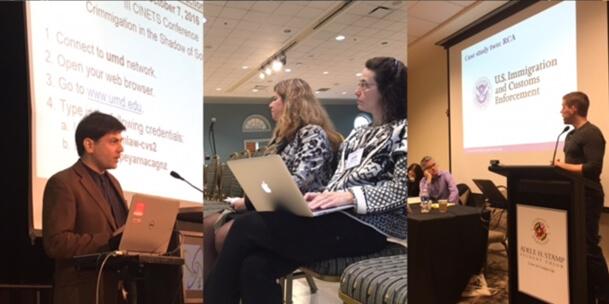
Students and academic scholars examined the convergence of criminal defense and immigration law at the third annual Crimmigration Conference on Oct. 6-7.
The Crimmigration Conference is sponsored annually by the Crimmigration Control International Net of Studies (CINETS). The first two conferences were hosted in Portugal and the Netherlands; this year, Justice and Legal Thought Scholars Director Robert Koulish organized the the 18-panel conference at the University of Maryland.
Koulish remarked that he was pleased with how eager professionals were getting involved politically to change laws and policies regarding this serious issue.
"For me, the takeaways [from the conference] were how eager people are to collaborate on this issue, how eager they are to put aside narrow differences and how they look at the issue and how they can gain value by joining forces to collaborate in projects in the future," said Koulish, a founder of CINETS.
"Crimmigration is a huge issue currently and it often faces a lot of inaccurate assumptions, such as immigrants from Latin and South America all being criminals,” JLT Scholar alumna Hope Goodman said. “The issue is so much more complex than that, so I love that this conference allowed scholars to come together to highlight the reality of the issue."
Goodman served as a communication liaison in the planning of this event. She also led a number marketing efforts to reach out to students and local academics and law practitioners, and helped Koulish plan and structure the presentation program.
"In terms of planning, my background knowledge on legal/criminal issues from my time in JLT allowed me to create a strategic and cohesive conference schedule in terms of who was on which panel," the junior psychology and criminology major said. "Whether it was the trafficking and labor exploitation panel or the panel on Social Justice and Immigration, themes we engaged with JLT came through repeatedly, which was super refreshing and allowed me to deepen my understanding of how the law interacts with social justice issues."
Current JLT Scholars were offered extra credit assignments for attending the conference; they were asked to pay particular attention to the sessions involving race and crimmigration law and social justice and activism issues, Koulish said.
"It was an incredible thing to be able to bring together passionate scholars from around the world to share thoughts, develop new ideas and inspire one another and students on campus,” Goodman said. “Seeing this positive interaction made all the planning worthwhile."